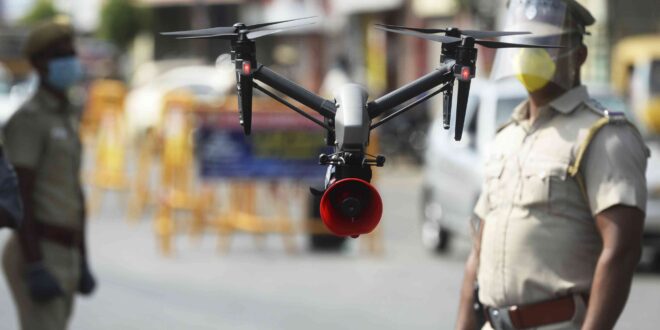The eye of the camera is hard to dodge at Greater Kailash-I, an affluent neighbourhood in South Delhi – home to businessmen, journalists and politicians.
Over 100 closed-circuit television cameras installed by the Delhi government and the residents’ welfare association keep watch over entry and exit points of each lane.
But even that is not enough, said Rajiv Kakria, head of the Greater Kailash-I Residents’ Welfare Association. “About 20% of the homes and shops have installed additional cameras on their own,” he said.
Greater Kailash-I includes around 4,000 households with a population of around 20,000.
Kakria is an ardent advocate of installing more cameras for the safety of the neighbourhood. Currently, the cameras in GK-1 can film in relative darkness but Kakria said he was scouting for advanced technology that can sharply focus and even read number plates. “We are planning to buy around 15 such cameras which would cost us around Rs 3.5 lakh,” he said.
Kakria dismisses concerns of possible violations of privacy. “I don’t care a damn about privacy,” he said, arguing that surveillance on streets compels people to behave well. “Your privacy is anyway gone. We are being tracked by our gadgets and apps. Why can’t the police not know then?”
His views bear out a recent study, which found that rich Indians are more likely to support the use of surveillance technologies by the state compared to the poor, religious minorities, tribals and farmers.
For the joint study by Common Cause, a non-profit organisation that campaigns for probity in public life, and the research institute Centre for the Study of Developing Societies, 9,779 people were interviewed across 12 states.
The study found higher approval for the use of drones, CCTVs, biometric data collection, facial recognition technology from people who belonged to higher income groups, as compared to people from poor and marginalised communities.
The findings are consistent with previous studies conducted by CSDS on policing in India, said Vipul Mudgal, director of Common Cause. For example, a study carried out in 2020 found a clear class divide in the way the police were perceived, with the poor and lower-income groups more fearful of police personnel during the lockdown.
The reasons behind the results, Srinivas Kodali, a digital rights expert says, are “simple”.
“This is how our society functions,” he said. “The rich need policing systems to protect their assets, while the poor are at the receiving end of these practices.”
Prasanth Sugathan, the legal director of Software Freedom Law Centre, India, too, agreed that the rich are likely to support surveillance because they are less likely to bear the brunt of policing than the poor.
Drones, cameras, and curbing protests
The survey found that half of the rich respondents strongly supported and justified drone surveillance by the state – compared to 39% of the poor and 40%-45% of the middle class. Only 3% were completely against the use of drones.
However, more than half the respondents said they worried that drones could be misused to collect their photos and videos.
But, at the same time, 60% of the respondents supported the use of drones to curb protests. The support for drones was the highest in BJP-ruled states like Haryana, Gujarat and Uttar Pradesh.
A quarter of Indians opposed the use of drones to control protests. The opposition was significant in Karnataka, Kerala, West Bengal, and Punjab.
When it came to the use of security cameras to control protests, the results were similar. Seventy-eight per cent of the respondents justified the use of CCTV cameras for this purpose – 52% supported it to a great extent and 26% to some extent. Only 7% completely opposed the idea.
People from poorer backgrounds are less likely to support the use of security cameras to curb political movements or protests, the survey found.
For instance, 70% of respondents living in slums supported the use of security cameras against protests, compared to 82% of people from higher-income neighborhoods.

Across religious groups, 73% Muslims and 76% Sikhs were against the use of security cameras to curb protests. Among Hindus, 79% supported it, with 54% approving the idea to a great extent.
Almost half the respondents said the police should be allowed to collect biometric details of people who are suspected, accused or convicted of crime.
Under the Criminal Procedure (Identification) Act 2022, which was enacted last year, authorities can collect palm prints, fingerprints and footprints, DNA, retina and iris biometrics and several other behavioural and physical features, including handwriting and signatures, of those apprehended for a criminal investigation. Even those detained during an investigation have to allow the police to collect these details.
The law allows the agencies to store biometric data of convicts as well as undertrials with an understanding that they might, in the future, be possibly involved in an illegal act.
Across communities, Muslims, tribals and Dalits were least supportive of the idea that authorities should have such a power. Those belonging to the Adivasi community (44%) were significantly more likely to oppose giving the power to the police to collect biometric data, as compared to the general caste group (28%). Similarly 34% of Dalits opposed empowering police to collect biometric data.
The study explains this reluctance among Muslims and Adivasis by referring to the rate of imprisonment of people from these communities. Data from the National Crime Records Bureau has repeatedly shown that the proportion of those incarcerated – either as undertrials or convicts – from the Scheduled Caste, Scheduled Tribe, Muslim communities and the Other Backward Classes is higher than their share in the overall population.
The tech bias
Digital privacy experts also point out that technology is not always used in an objective manner, but reinforces prejudices against the poor.
Take the case of Mohammed Khadeer, a 35-year-old labourer from Hyderabad, who was arrested in a case of chain-snatching and died in police custody in February. Before his death, he recorded a video, accusing the police of custodial torture.
According to media reports, Khadeer had been arrested on the basis of unclear footage from a CCTV camera. “He was brought for questioning in connection with a chain snatching incident as his facial features look similar to the suspect in CCTV footage,” a senior police official told The Times of India.
A survey carried out by the Internet Freedom Foundation and Amnesty International in Hyderabad in 2021 had found extensive use of cameras in the city. “We found that 53.7% and 62.7% of the total area of the two neighborhoods of Kala Pathar and Kishan Bagh we surveyed was covered with CCTVs,” said Anushka Jain, who works with IFF. “The cameras in lower-income neighborhoods may also be used to monitor those who live there,” she said.
Jain and other privacy activists have flagged the risks of the lack of regulation of these technologies. “There is no law to regulate how these technologies are being used. It can lead to surveillance of over-policed communities and confirm existing biases in the police,” she said.
Jain added: “The Hyderabad police use this CCTV footage in their investigations. That is how Khadeer was likely picked up.”
Experts say that the support of the privileged for surveillance technology leads to policies that breed inequality.
“Because of these policing practices, the less privileged are excluded from economic participation, thus creating and reinforcing inequalities,” said Srinivas Kodali. “Rich people are free to roam around, but the poor are policed for being in different neighborhoods at odd hours using cameras,” Kodali said.
 Unmanned Aerial Vehicle The latest drone news
Unmanned Aerial Vehicle The latest drone news




